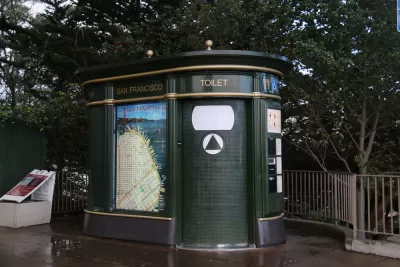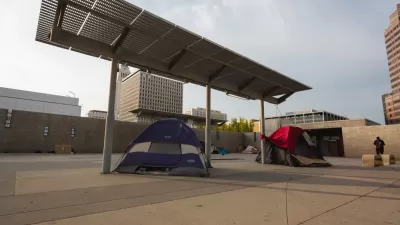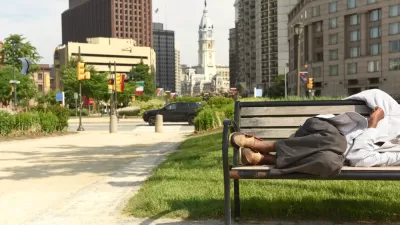The city is planning to remove the hundreds of public toilets and hand-washing stations installed during the pandemic. But the need for them isn't going away.

Without access to public toilets, writes the Los Angeles Times editorial board, "the unhoused have no choice but to carry out their most necessary and private of bodily functions on public streets and sidewalks." Thus, the city should continue its efforts to provide adequate public bathrooms for its unhoused population.
"A 2017 study of bathroom availability found that the number of toilets available to 1,800 homeless people on skid row at night — nine — was fewer than the United Nations High Commissioner for Refugees’ standard of one toilet for every 20 people in a refugee camp." Yet, despite installing 363 hand-washing stations and 182 portable toilets during the COVID-19 pandemic, the city is now removing all of them, citing concerns about safety and vandalism.
"The city insists that these installations were only intended to stay in place during the height of the pandemic as a public health measure. But COVID-19 is still a danger to the homeless population." Not to mention the fact that the need for toilets isn't going anywhere after the pandemic.
We get it. Bathrooms are complicated. They get vandalized. What the city doesn’t seem to get is how urgently they are needed. Apparently residents have complained about the porta-potties near encampments — as if the sight of them signals that the city has normalized the existence of homeless encampments. Not at all. It signals that the city thinks it’s bad public health to normalize urinating and defecating on streets and sidewalks and in people’s yards. And that’s what happens when there isn’t enough housing and shelter and when there aren’t enough public bathrooms.
The board offers solutions including automated toilets that are more resistant to damage and vandalism and paying facilities like YMCA centers and churches to make their bathrooms available to unhoused people. As far as the remaining toilets at encampments, the board writes, "let them stay there — until the city actually comes up with another viable plan for how to get people to a bathroom."
FULL STORY: L.A. shouldn’t remove portable toilets from homeless encampments

Maui's Vacation Rental Debate Turns Ugly
Verbal attacks, misinformation campaigns and fistfights plague a high-stakes debate to convert thousands of vacation rentals into long-term housing.

Planetizen Federal Action Tracker
A weekly monitor of how Trump’s orders and actions are impacting planners and planning in America.

In Urban Planning, AI Prompting Could be the New Design Thinking
Creativity has long been key to great urban design. What if we see AI as our new creative partner?

Cal Fire Chatbot Fails to Answer Basic Questions
An AI chatbot designed to provide information about wildfires can’t answer questions about evacuation orders, among other problems.

What Happens if Trump Kills Section 8?
The Trump admin aims to slash federal rental aid by nearly half and shift distribution to states. Experts warn this could spike homelessness and destabilize communities nationwide.

Sean Duffy Targets Rainbow Crosswalks in Road Safety Efforts
Despite evidence that colorful crosswalks actually improve intersection safety — and the lack of almost any crosswalks at all on the nation’s most dangerous arterial roads — U.S. Transportation Secretary Duffy is calling on states to remove them.
Urban Design for Planners 1: Software Tools
This six-course series explores essential urban design concepts using open source software and equips planners with the tools they need to participate fully in the urban design process.
Planning for Universal Design
Learn the tools for implementing Universal Design in planning regulations.
Appalachian Highlands Housing Partners
Gallatin County Department of Planning & Community Development
Heyer Gruel & Associates PA
Mpact (founded as Rail~Volution)
City of Camden Redevelopment Agency
City of Astoria
City of Portland
City of Laramie





























